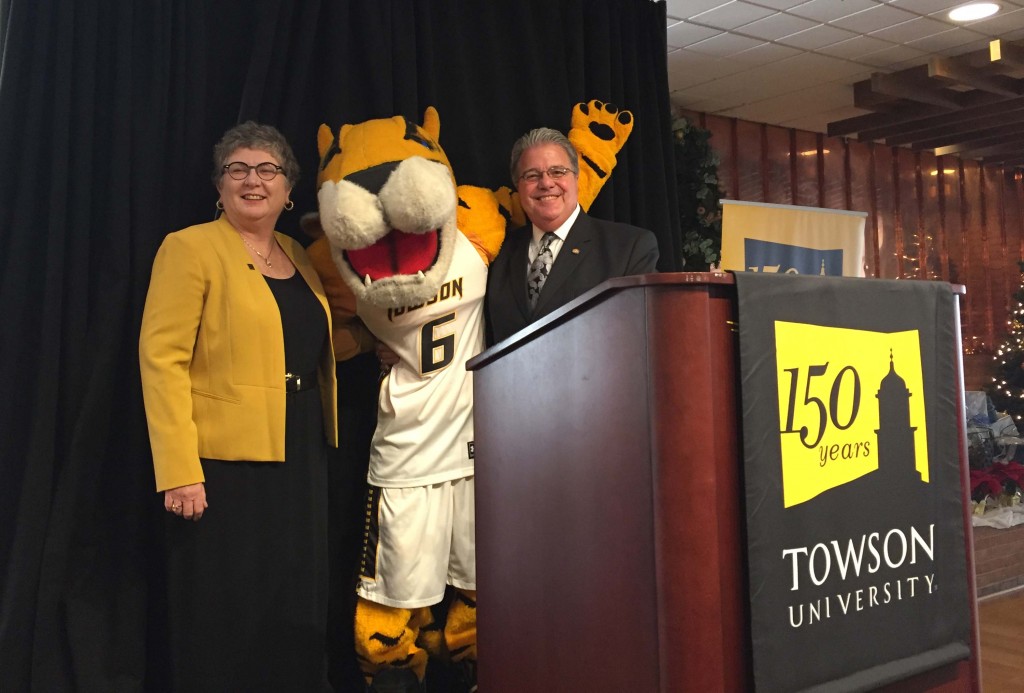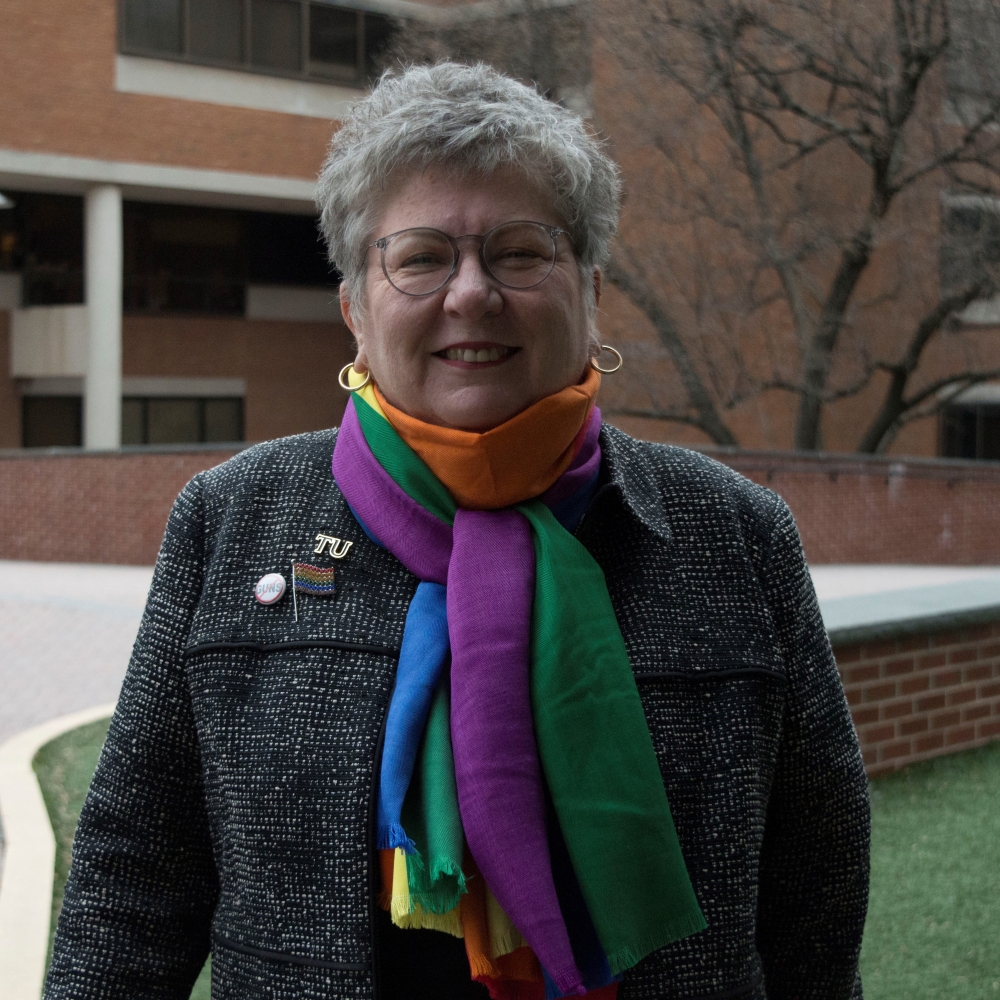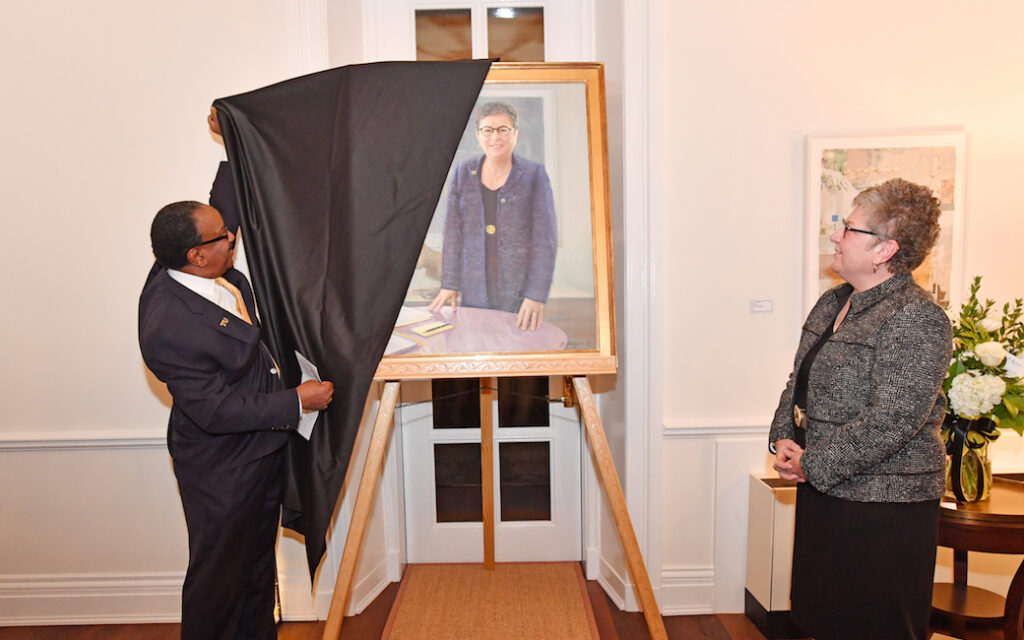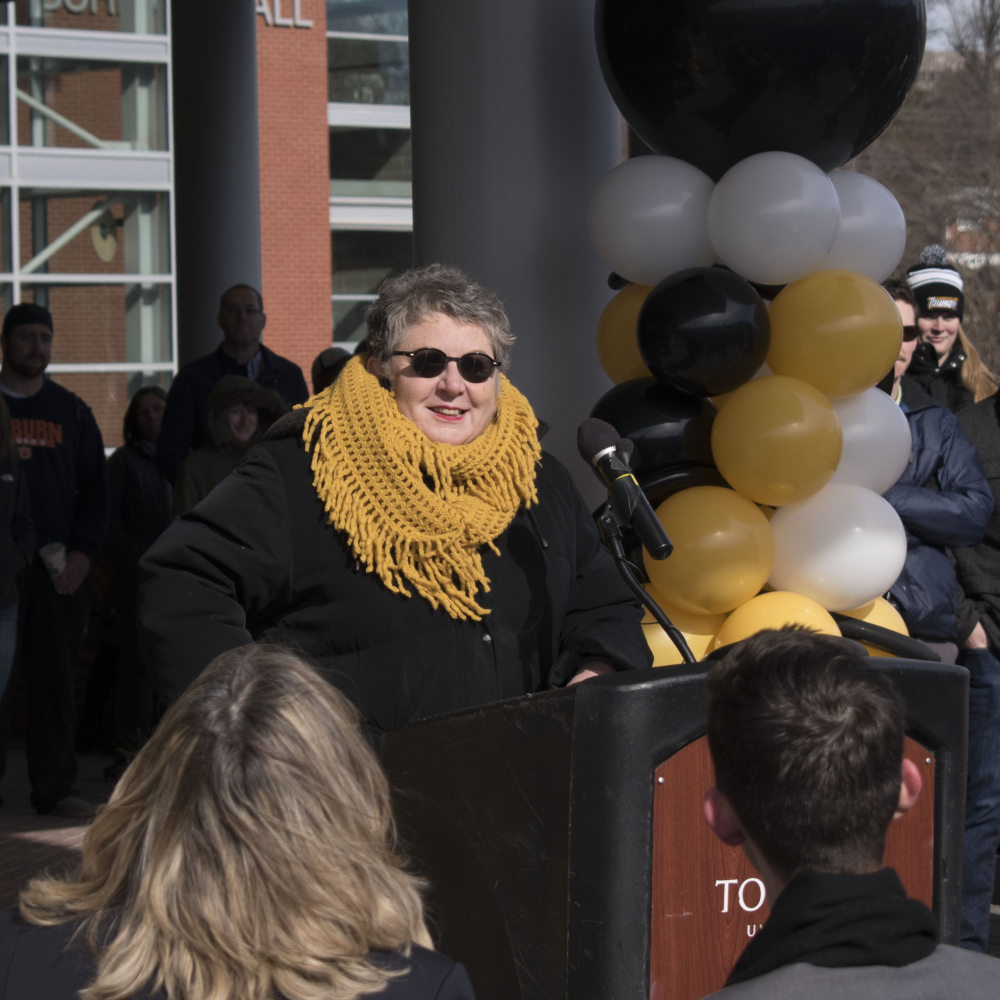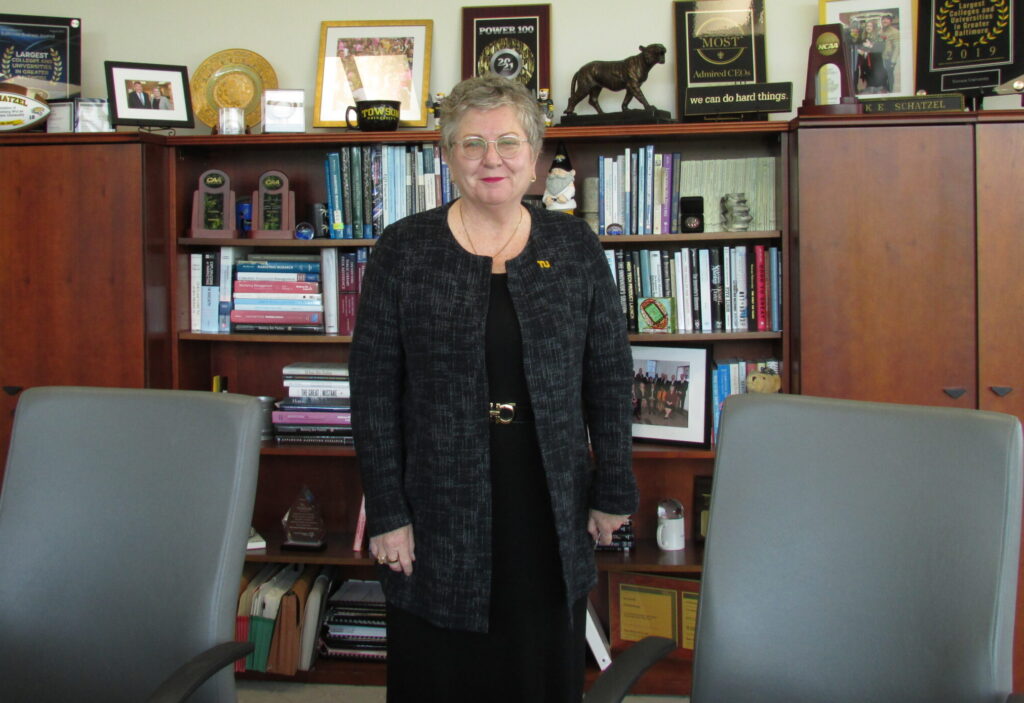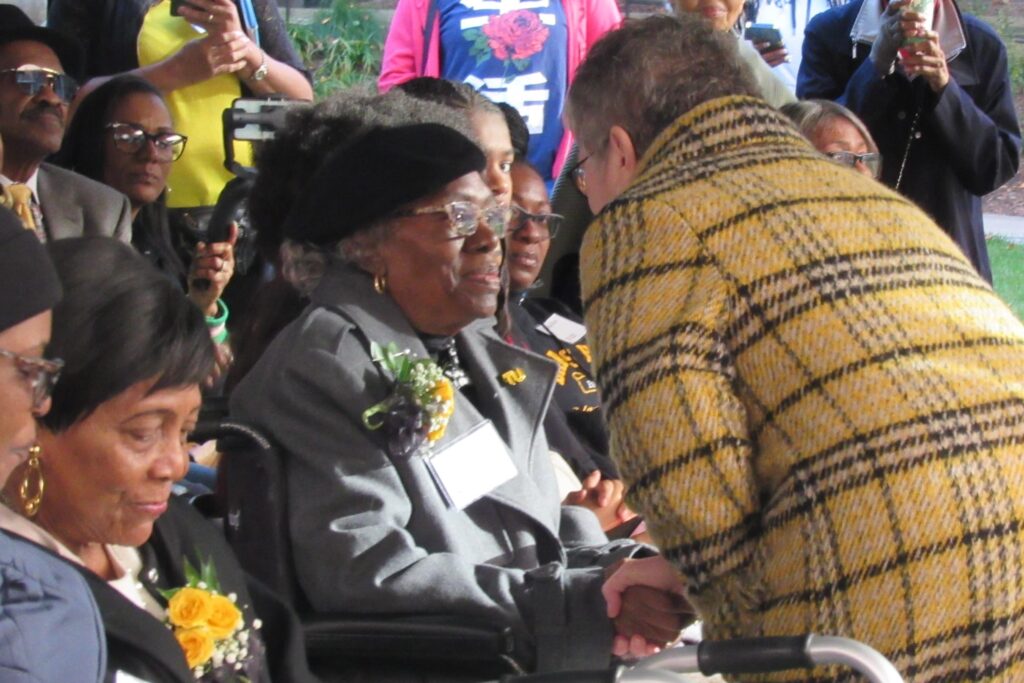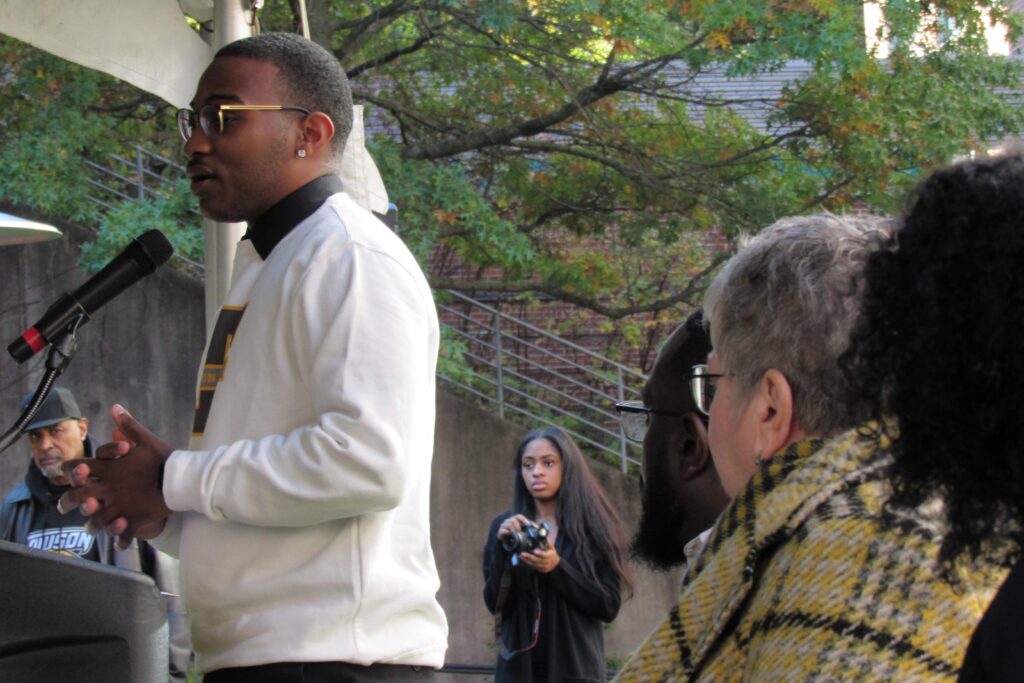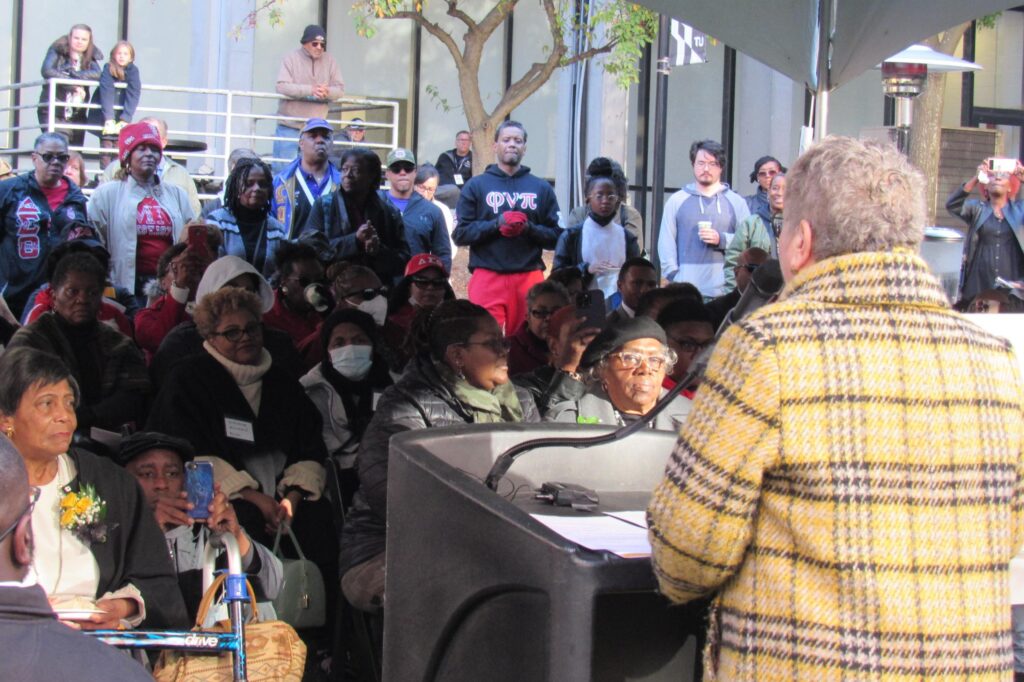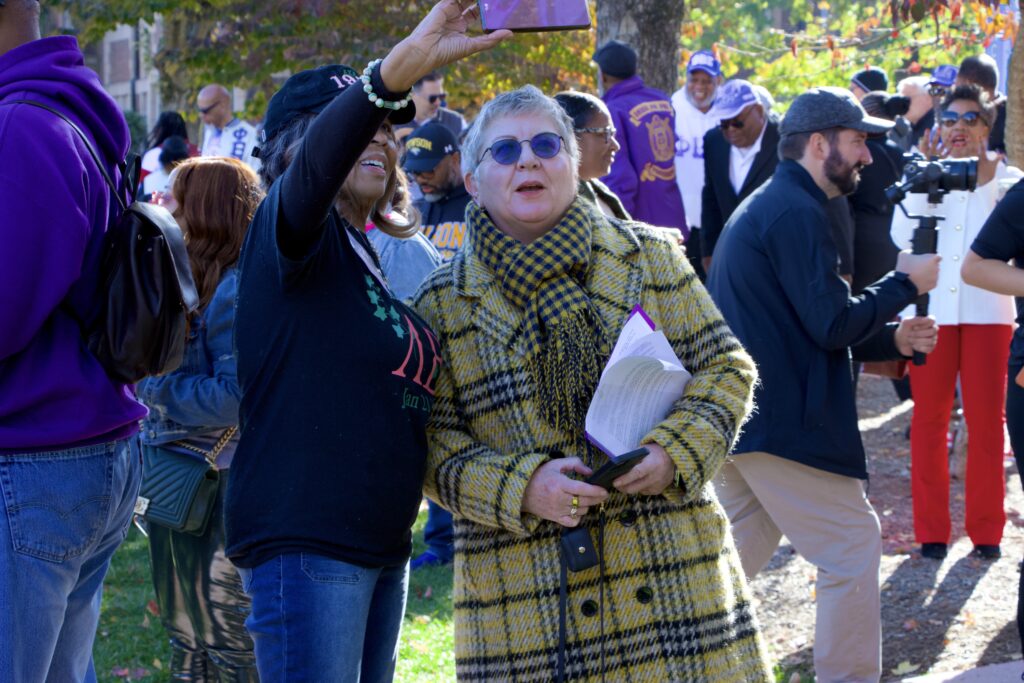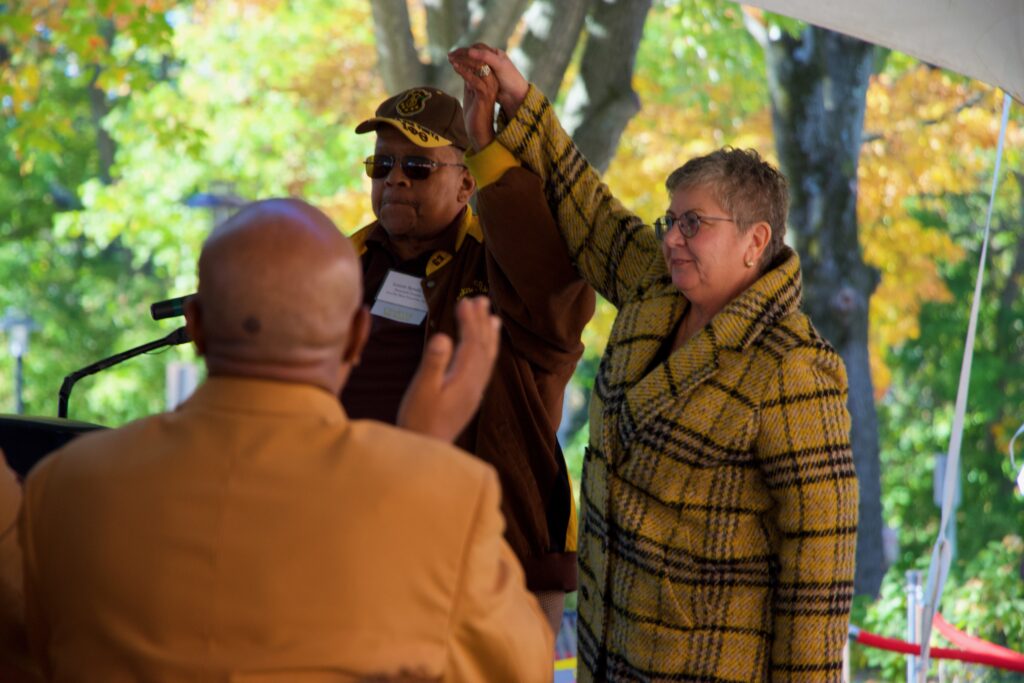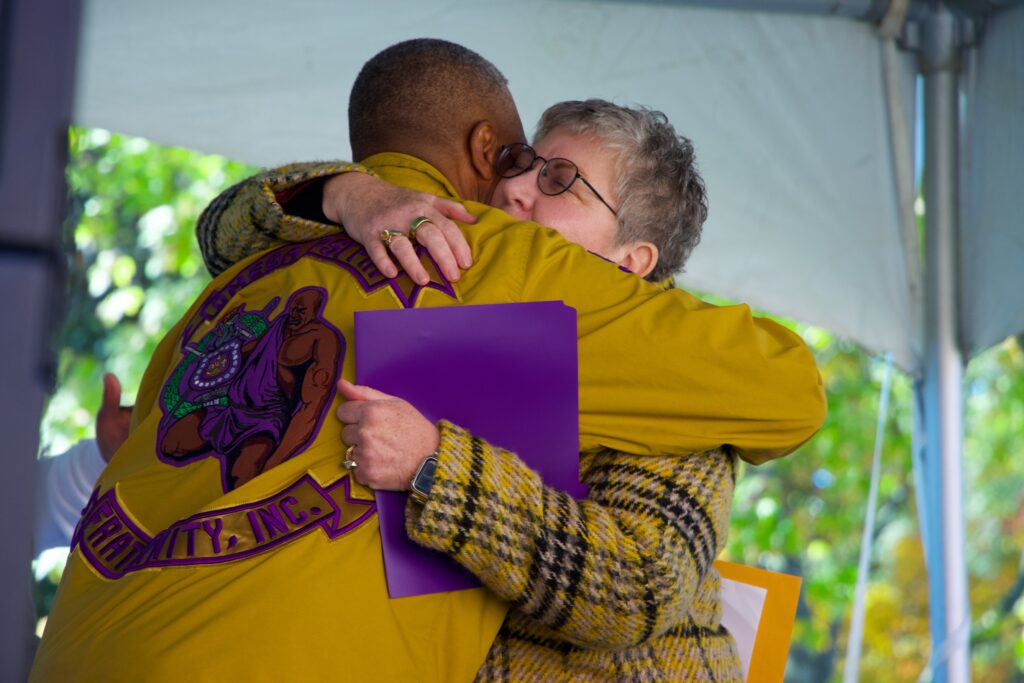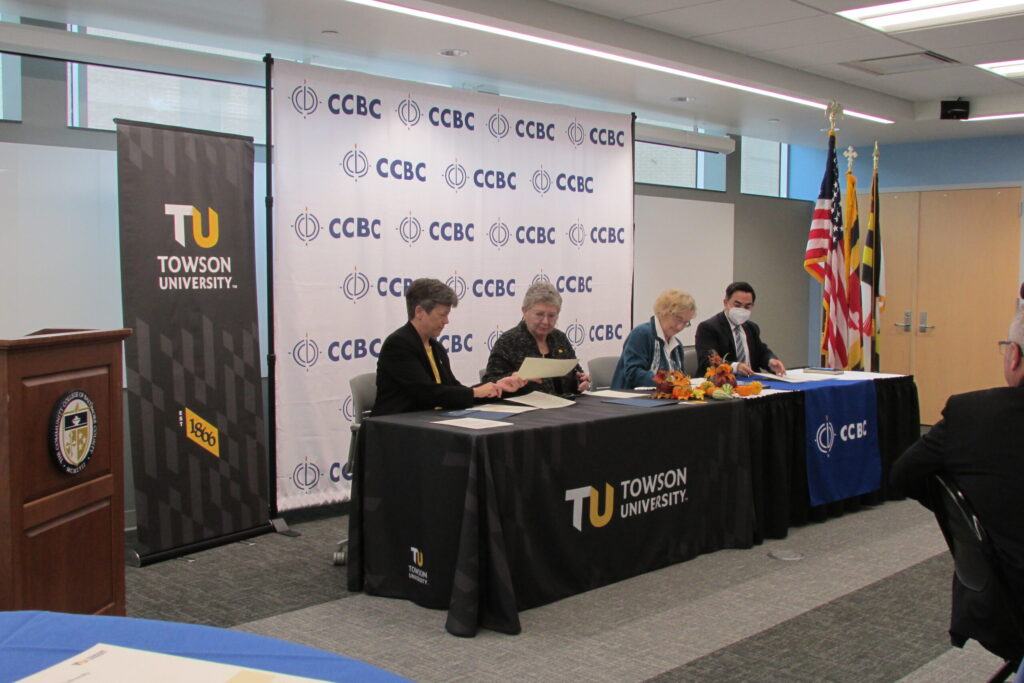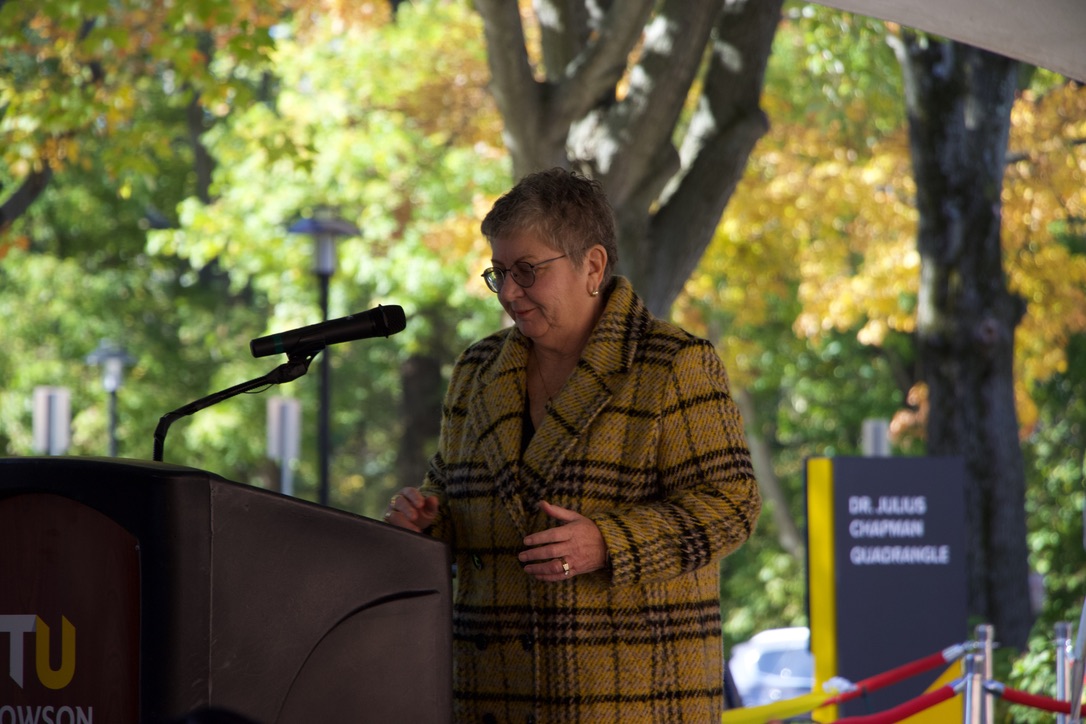
While Schatzel leaves a legacy of growth, some say she lacked connection with students
By: Caitlyn Freeman, Editor in Chief
Kim Schatzel’s impact as Towson University’s 14th president is tangible as you walk through campus, with the many new buildings and buzz of construction workers.
While Schatzel leaves behind a legacy of major campus growth, some Towson students say she struggled to resonate with them.
“I only saw her at speaking events and stuff like convocation,” Sophomore Eamonn Carr said. “That’s the only time I’ve ever seen her in person. Or like it was either that or a photo op she did showing off her designer belt.”
Schatzel’s campus
Schatzel departed Towson on Feb. 1 to take over the University of Louisville presidency.
In a campus-wide email sent Monday, Schatzel thanked the community for its support during her tenure.
“I have had the wonderful privilege of seeing TU’s momentum and reputation soar to new heights,” Schatzel wrote.
Before coming to Towson, Schatzel was the provost and executive vice president of academic and student affairs at Eastern Michigan University. Before entering higher education, she was in several leadership positions within the manufacturing industry, according to her LinkedIn.
When announcing her appointment to Towson, former University System of Maryland Board of Regents Chair James Shea pointed to her business experience as beneficial to the university.
“She has been successful in both higher education and the private sector,” Shea said in a 2015 press release. “And she has a strong record of developing effective partnerships between higher education and business. This combination of experience will serve Towson and the University System of Maryland well in the years ahead.”
As president, Schatzel oversaw several large construction projects, including the renovated University Union and the new Science Complex. The state invested $1 billion in capital projects throughout Schatzel’s tenure, University System Chancellor Jay Perman said in a November letter announcing her departure.
Schatzel also greenlit the ongoing construction of the new College of Health Professions building set to open in fall 2024.
“It’s the first time in our history that we’re going to have instruction and research of that college under one roof,” Schatzel told The Towerlight in a September interview. “We’re the largest provider of healthcare professionals in the state of Maryland, and we don’t have a building right to be able to house that instruction, that research.”
Schatzel declined several requests for an interview with The Towerlight before her departure.
“Dr. Schatzel offered a campus message to convey her thoughts on her time as TU’s 14th president,” a university spokesperson said in a statement. “We were unable to secure time to make the president available for media interviews in her final days in office.”
Beyond campus, Schatzel led the charge to expand the university’s presence within Baltimore County. In 2019, Towson began leasing the Armory building at 307 Washington Ave, which currently houses a business accelerator and free public working space.
Additionally, the university announced a partnership with the Community College of Baltimore County in October, creating an admissions pipeline for those attending the Community College to transfer to Towson upon receiving their associate degree.
Baltimore County Executive Johnny Olszewski said in a statement that Schatzel helped create innovation at Towson and was a “vital partner” in the revitalization of the Towson area.
“On behalf of the residents of Baltimore County, we thank Dr. Schatzel for her years of devoted service to Towson’s students, faculty, staff, alumni, and our entire community,” Olszewski said. “While she will be greatly missed, we wish her nothing but the best in her next steps as the next President of the University of Louisville.”
Another of Schatzel’s initiatives is the university’s push to obtain an R2 Carnegie Classification of high research. To receive the classification, Towson must spend at least $5 million on research and graduate 20 doctoral degrees annually.
The university changed its mission statement in September to expand its research efforts and assist in its R2 push. Obtaining an R2 classification, as Interim President Melanie Perreault said, would thrust Towson into national conversations.
“We have an outstanding faculty as well as students,” Schatzel said. “We already offer doctoral programs, so to be able to elevate that side of the institution was really just a real natural next step for us.”
Increased student diversity
Throughout Schatzel’s tenure, Towson’s minority student population has consistently increased, with 54.7% of its student population identifying as a racial or ethnic minority in Fiscal Year 2022, University System data shows. In comparison, FY 2017 saw 39.5% minority undergraduate students.
As a result, Towson is on track to become a majority-minority institution.
Schatzel said in September that, upon her arrival, she consistently heard that minority students didn’t feel welcomed or included at the school because of their racial or ethnic backgrounds. She said she made it a priority to change that.
She created the Office of Inclusion and Institutional Equity in 2016, the first University System president to do so.
“I feel really strongly the fact that a diverse and inclusive campus is a requirement for a high-quality education,” Schatzel said. “You can’t be in a classroom that’s not diverse and inclusive and feel like you’re getting the kind of excellent education that you want at a university level.”
Response from leadership
University System Chancellor Jay Perman called Schatzel’s departure a loss for Towson in November.
“The fact that Dr. Schatzel was tapped to head a university as nationally prominent as UofL, as highly regarded, speaks to her enormous talent and drive, which we’ve seen up close since she was named TU’s leader nearly seven years ago,” Perman said in the email.
The University System declined to make additional statements on Schatzel’s departure.
Additionally, several members of the university’s shared governance bodies praised Schatzel for her leadership. Junior Jordan Colquitt, president of the Student Government Association, said Schatzel’s successor would have a big legacy to live up to.
“I think Towson has really become such a leader and innovator in the region and nation due to her drive, her innovation and her experience, so I definitely think she leaves big shoes to fill,” he said.
Heather Sorensen, chair of the Staff Senate, praised Schatzel for bringing Towson into national conversations.
“We will certainly strive to uphold her legacy as a champion for TU, and we wish her the best,” Sorensen said in an emailed statement.
Academic Senate Chair Desirée Rowe also praised Schatzel in an emailed statement.
“[Schatzel] was a decisive leader at TU for the past seven years who leaves behind a legacy of growth and innovation,” Academic Senate Chair Desirée Rowe said in an emailed statement. “The Academic Senate continues our consistent efforts to advocate for TU faculty as they research, educate, and serve.”
In addition to improving the physical campus, Jonas Jacobson, president of the Towson Alumni Association who graduated in 1990, said she helped increase alumni engagement during her tenure.
“In my experience, President Schatzel has been the best president of the school since I graduated,” he said.
Schatzel and students
In October, screenshots of messages from members of Towson’s chapter of Turning Point USA using racist, homophobic and ableist language circulated campus via media platforms like Yik Yak and Instagram.
At the time, observers on social media wanted to know — would Towson’s leadership, specifically Schatzel, call out the right-wing student group and denounce white nationalism?
Schatzel stayed silent. It’s the type of inaction some students say defines her tenure.
Once the messages began circulating, students took to social media, primarily Instagram, demanding that Schatzel address the messages. But the only Towson administrator to publicly address the incident was Patricia Bradley, vice president for inclusion and institutional equity.
Later, in November, some community members were also outraged when news broke that Richard Vatz, a longtime Towson professor, donor and adviser to Turning Point, was having an auditorium dedicated in his name.
Many students called for Schatzel to reverse the decision, citing Vatz’s affiliation with Turning Point and his sponsorship of another far-right student organization in 2011. Students took to social media, and faculty members and shared governance bodies wrote dissenting letters. Schatzel remained silent, and the auditorium was dedicated in December.
Carr said Schatzel could’ve done more to address the messages.
“The fact that she didn’t [speak out against Turning Point], and the fact that she didn’t see how her being silent could be seen by the student body, I think that is a bit of a problem,” Carr said.
Sophomore J. Williamson agrees and said Schatzel should’ve released a statement denouncing the group.
“I wish she could have been more present in the situation,” Williamson said. “Now, I feel like she’s trying to escape from Towson and just moving on instead of facing the issue that came up.”
Carr said Schatzel’s silence about Turning Point and Vatz’s dedication highlighted her tendency to be disconnected from the student body. He feels she only tried to be around students for photos and speaking events.
Further, he said there was a greater emphasis on campus improvements overall than on other aspects of the university.
“The new buildings are great and everything, but at the same time, that paired with the general disconnect felt by students, it kind of gives off that there was more focus on the actual look of the university and our campus for potential students or donations or whatever,” Carr said. “It kind of conveys to me that there was more focus on that than actually connecting with the student body and the university itself.”
Senior Kendall Stokes said Schatzel’s departure would give the university a chance to replace her with someone better suited for the role. They said Schatzel’s response to the messages, paired with her background in business, leads her to be detached from the needs of the student body.
“I think school politics are like vastly different than real-world politics, even though they are connected,” Stokes said. “I do think it does take a different approach. These are kids or students learning to navigate the world for the first time.”
Similarly, one Towson senior, who asked to remain anonymous due to fear of retribution, said they felt Schatzel focused primarily on improving the campus physically while forgetting about the student life aspect.
“I feel like her improvements has gone to the campus rather than the people that are actually on campus and giving their money every year,” they said.
They said they’d only seen Schatzel once during their time at Towson.
“She could’ve shown her face more,” they said.
Alternatively, while he wishes more could’ve been done to address the messages, Logan Turner-Mannix said he wasn’t sure if Schatzel had the agency to do so. However, he agrees with the sentiment of her being disconnected from the campus but views her positively overall.
Colquitt disagreed with the sentiment that Schatzel was disengaged with the campus and said her role required a lot of work that kept her away from students day-to-day.
“I think as much as she could, she was definitely interacting with students,” he said.
TU’s next president
Perreault will serve as the university’s interim president as the University System conducts a nationwide search to replace Schatzel. She said she plans to utilize the current momentum to keep the university running smoothly during this transition.
Additionally, Perreault, who became provost in 2019, said she plans to make her presence on campus known by walking around campus often and engaging with students.
“I think you’ll find in the next few months that you’ll get tired of seeing my face,” she said.
Some students, including Carr, said they hope Schatzel’s permanent successor will be more actively engaged with the student body.
“I still think, at the very least, if you’re the president of a university like this one, with such a huge and diverse student body, I think that you should be more involved,” he said.

